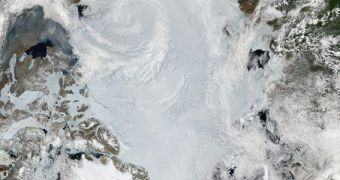Scientists with the Department of Earth Sciences at the University College London (UCL) determined in a new scientific study that the length of the ice-free season in the Arctic is increasing at an alarming rate, of roughly 5 days per decade. This season is defined as the period when sea ice extents are at their minimum, experts say.
This worrisome conclusion is based on an in-depth analysis of satellite data covering the entire Arctic and adjacent areas. What the team determined is that the North Pole appears to be absorbing more energy and heat from incoming sunlight, instead of bouncing it back in space.
This is basically a vicious circle, where the more ice melts, the more the Arctic warms and promotes additional melting. Directly, this is manifested in the Arctic through a delay in the appearance of sea ice during the autumn. As the Arctic Ocean stores additional heat in the summer, it takes longer for it to cool enough to allow for the formation of ice.
In turn, this process is contributing to an ever-accelerating melting of multi-layer, multi-year ice, which is the basis of the entire Arctic ice shelf. This type of ice does not melt from one season to the next; it is basically what endures throughout the summer and is then built upon in autumn and winter.
The UCL group, led by professor of polar observation and modeling Julienne Stroeve, determined that, in some areas of the Arctic, autumn freezing occurs up to 11 days per decade slower than it should. These discoveries have significant ramifications for planning the shipping and the resource industries in the area, since new shipping lanes open up due to ice melt every year.
“The extent of sea ice in the Arctic has been declining for the last four decades. The timing of when melt begins and ends has a large impact on the amount if ice lost each summer,” Stroeve explains.
“With the Arctic region becoming more accessible for long periods of time, there is a growing need for improved prediction of when the ice retreats and reforms in winter,” the expert goes on to say, quoted by Click Green.
The UCL team is also careful to point out that even a small variation in the amount of ice available during the summer to reflect light back into space can lead to significant differences in the amount of heat the Arctic Ocean stores. In other words, these variations have a potentially disastrous cascading effect.
“The headline figure of five days per decade hides a lot of variability. From year to year, the onset and freeze-up of sea ice can vary by about a week. There are also strong variations in the total length of the melt season from region to region: up to 13 days per decade in the Chukchi Sea, while in one, the Sea of Okhotsk, the melt season is actually getting shorter,” Stroeve concludes.

 14 DAY TRIAL //
14 DAY TRIAL //